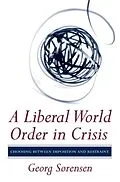The collapse of the bipolar international system near the end of the twentieth century changed political liberalism from a regional system with aspirations of universality to global ideological dominance as the basic vision of how international life should be organized. Yet in the last two decades liberal democracies have not been able to create an effective and legitimate liberal world order. In A Liberal World Order in Crisis, Georg Sorensen suggests that this is connected to major tensions between two strains of liberalism: a "liberalism of imposition" affirms the universal validity of liberal values and is ready to use any means to secure the worldwide expansion of liberal principles. A "liberalism of restraint" emphasizes nonintervention, moderation, and respect for others.
This book is the first comprehensive discussion of how tensions in liberalism create problems for the establishment of a liberal world order. The book is also the first skeptical liberal statement to appear since the era of liberal optimism-based in anticipation of the end of history-in the 1990s. Sorensen identifies major competing analyses of world order and explains why their focus on balance-of-power competition, civilizational conflict, international terrorism, and fragile states is insufficient.
Autorentext
Georg Sorensen is Professor of Political Science at the University of Aarhus. He is the author of several books, including Democracy and Democratization: Processes and Prospects in a Changing World and Changes in Statehood: The Transformation of International Relations.
Inhalt
Introduction: The Argument1. The Debate on World Order2. Tensions in Liberalism: Universal Values for All or a Pluralist World?3. Values and Liberal World Order4. A Different Security Dilemma: Liberals Facing Weak and Failed States5. Free Markets for All: The Difficulties of Maintaining a Stable Liberal World Economy6. Institutions and Liberal World OrderConclusion: Prospects for Liberal World OrderList of Abbreviations
References
Index
